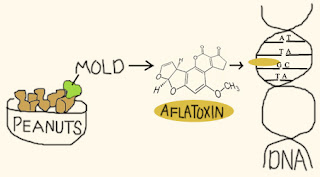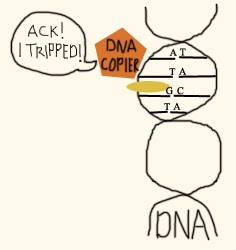This was one of the first chemical reactions we studied in my "Organic Chemistry of Life" class in college because the chemical reaction is well known, and the concept relates well to practical reality. Being that we're trying to keep things simple, let's invoke a diagram:
As a normal part of your life, your cells (the building blocks of YOU!) make copies of themselves as you grow and change. There's machinery inside each of your cells that makes copies of your DNA. Your DNA is your internal guidebook for everything about you - your hair color, your metabolism, and every piece of communication and cooperation that happens within you.
If a DNA intercalator wedges itself into your DNA, the DNA copy machine trips over it and messes up. It changes your code. Sometimes a harmless error is made. Sometimes an important error is made and your code changes in a way that throws off all future communications that cell will engage in. We'll call these code changes "DNA mutations". DNA mutations can make your cells grow faster, stop listening, and hide from your internal army of immune cells that constantly patrol and keep a lookout cancerous cells, among other things. Liver cancer is a common outcome, as your liver ends up interacting with aflatoxin as a byproduct of processing what you eat.
Is it just peanuts we have to worry about here?
Peanuts seem to be the most commonly associated food, but cooking oils, corn, major cereal crops / grains, tree nuts, and cotton seed can all be affected.
Just by eating it?
Eating it, and sometimes even touching it - some types of aflatoxin permeate the skin. Also, meat can contain aflatoxin if the animals were fed moldy grains.
Uh, so what do I do with this newfound trove of information?
The United States FDA has set thresholds for safe levels of aflatoxins in food products, and commercial food products are routinely screened, so the first thing to do is breathe a sigh of relief. Next, throw out any nut or grain products that are past their expiration date or have visible signs of mold... or have just been sitting in your pantry for way too long.
Questions? Leave a comment!
- Angela



No comments:
Post a Comment